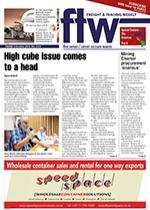South African fruit exporters are pulling out all the stops to ensure compliance with electronic certification regulations due to be implemented by the European Union in the next year or two.
A joint Department of Agriculture, Forestry and Fisheries (Daff) and Fruit South Africa pilot project on electronic certification had its first breakthrough this month with the clearing of the first electronic phyto certificate into the Netherlands import system. “This is the first small step in the joint development between South Africa and the Netherlands to eliminate onerous clearing processes and to go paperless,” said Jack Vera, agricultural counsellor at the Kingdom of the Netherlands Embassy in Pretoria.
He told FTW that the government of the Netherlands had decided to partner with South Africa on this to reduce red tape, cut down on fraud and speed up the clearing process at the port. Andy Connell of A-Bar-C Services said the majority of citrus fruit exports, for example, were cleared at the Port of Rotterdam and that too often the paperwork was incomplete and misleading, creating further delays as port clearing agents had to rally to verify the information.
“This means the perishables consignment is at a higher risk of spoiling before it reaches its destination and the exporter may have to write off that sale,” he said. Therefore, in March this year, Fruit SA signed a service level agreement (SLA) with Daff to develop online capabilities to issue electronic certificates as a replacement for the paper-based phytosanitary certificates that are now in use.
“This means that once the e-certificate has been issued, it can be sent straight on to the port of destination for speedy clearance,” said Vera, pointing out that the Netherlands had already established agreements and working systems with 13 other countries worldwide. “South African exporters using the Netherlands system can therefore use the same system with other countries they export to such as China and Russia.”
He said, that this project was bigger than one bilateral trade agreement. Vera emphasised that while the first electronic phyto certificate had been successfully cleared, this was only a pilot project with development of the system between South Africa and the Netherlands still “a few years off”.
“It is now up to Daff to decide how to implement the system,” he said. The Citrus Growers’ Association (CGA) is managing the project on behalf of Fruit SA. CEO Justin Chadwick agreed that “much work” remained over the next 18 months to improve the official systems leading up to the point of export. He highlighted in a recent CGA newsletter that progress had been made, with Fruit SA setting up dedicated space for the e-certification platform in Hillcrest near Durban.
“New expertise has also been appointed and there have been a number of high-level stakeholder engagements around the system,” said Chadwick. The move towards e-certification for fruit exports into the Netherlands is part of a World Trade Organisation (WTO) agreement for all imports and exports to eventually move towards paperless clearing processes. “The EU will, in the next year or two, introduce regulations that will require all exporters into the region to make use of electronic certification,” said Vera.
The EU will introduce regulations that will require all exporters into the region to make use of electronic certification. – Jack Vera

